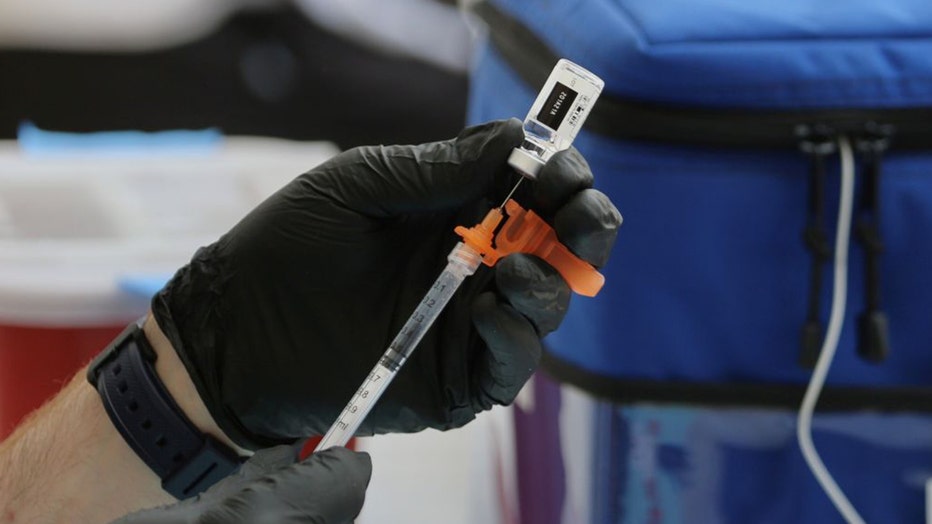COVID-19 vaccines prevented nearly 140,000 US deaths, NIH study says
A recent study from the National Institute of Health found that the COVID-19 vaccines prevented nearly 140,000 more deaths in the United States.
The study, published in the journal Health Affairs on Aug. 18, said that more than 139,000 additional COVID-19 deaths were prevented as a result of the three COVID-19 vaccines that were given emergency use approval by the U.S. Food and Drug Administration.
"About 570,000 COVID-19 deaths had occurred in the U.S. by May 9; the model projected about 709,000 deaths would have occurred without the vaccines," the NIH said.
Researchers analyzed data from each states’ government website and official statements between Dec. 21, 2020, to May 9, 2021.

FILE - A medical worker prepares the COVID-19 vaccines for local residents at the COVID-19 vaccination clinic in Pasadena, Calif. on Aug. 19, 2021.
RELATED: Daily new COVID-19 cases in US nears 230,000, Johns Hopkins says
Data also revealed that the "economic value of preventing these deaths was between $625 billion and $1.4 trillion," according to the NIH.
The number of deaths varied from state to state, according to the study. For instance, in New York, vaccinations led to an estimated 11.7 fewer COVID-19 deaths per 10,000 people, whereas in Hawaii, there were 1.1 fewer deaths per 10,000 people, according to the study.
"This study brings into focus the dramatic success of the early months of the nation’s coronavirus vaccine rollout," Christopher Whaley of the RAND Corporation said. The RAND Corporation, in conjunction with a team led by Dr. Sumedha Gupta of Indiana University, analyzed how the vaccine rollout affected COVID-19 deaths.
"The existence of multiple COVID-19 vaccines offers hope that the ongoing vaccination campaign will slow COVID-19 transmission, save lives, and enable a return to normal activities," the study’s authors wrote.
RELATED: Fauci expects vaccine uptick, hopes pandemic control could come in spring 2022
Meanwhile, new daily cases of COVID-19 in the U.S. reached a staggering 229,831 on Aug. 24, according to Johns Hopkins data.
The novel coronavirus has killed 908 people in the past 24 hours, according to the same data set.
The surge in new cases is due largely to the highly transmissible delta variant of COVID-19, which has sent cases, deaths and hospitalizations soaring in recent weeks in the U.S., erasing months of progress.
Deaths are running at about 1,000 a day on average for the first time since mid-March, and new cases are averaging 147,000 a day, a level last seen at the end of January.
RELATED: Full FDA approval of COVID-19 vaccines could spur more company, university mandates
The highest daily case rate recorded thus far was 293,508 in January 2021, according to data from the U.S. Centers for Disease Control and Prevention.
President Joe Biden urged those who have yet to get the COVID-19 vaccine to do so now, especially after the U.S. Food and Drug Administration just granted full approval of Pfizer’s shot on Monday.
"The moment you’ve been waiting for is here," Biden said, speaking to those who awaited what he dubbed the "gold standard" of FDA approval.
"Please get vaccinated today," he said.
RELATED: These companies are requiring employees to get COVID-19 vaccinations
More than 200 million Pfizer doses have been administered in the U.S. under emergency provisions — and hundreds of millions more worldwide — since December. In going a step further and granting full approval, the FDA cited months of real-world evidence that serious side effects are extremely rare.
On Monday, health experts expressed hope that the FDA's action would boost the U.S. vaccination rate, which bottomed out at about a half-million shots a day in July — down from a peak of 3.4 million a day on average in April.
The number of shots dispensed has since climbed to about 850,000 a day amid growing alarm over the highly contagious delta variant.
To date, 51.5% of the total U.S. population is fully vaccinated against COVID-19, while just under 61% has received at least one dose of a shot, data from the CDC showed.
The Associated Press contributed to this report.


